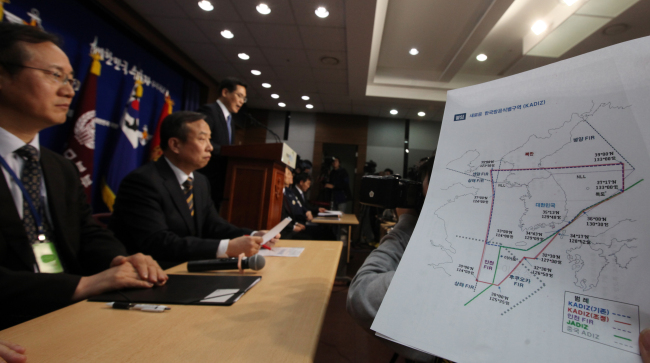 |
김민석 국방부 대변인이 8일 오후 기자실에서 한국방공식별구역(KADIZ) 확대안을 공식 발표하고 있다. (연합뉴스) |
<관련 영문 기사>
S. Korea announces air zone expansion to counter Chinese claims
South Korea announced a new air defense zone on Sunday to counter China's unilateral decision to expand its own, bolstering its sovereignty over a reef off the south coast and other islands around the Korean Peninsula.
The new air defense and identification zone was designed to have its southern boundary match the country's broader flight information region (FIR), and includes airspace over the South-controlled reef of Ieodo and the islands of Marado and Hongdo, the defense ministry said.
Its eastern and western boundaries remain the same as before, it said.
The ministry said the new zone will take effect beginning Dec. 15.
The announcement came in response to China's Nov. 23 decision to create a new air zone that overlaps those of South Korea and Japan, and includes Ieodo and a set of islands at the center of a territorial dispute between Tokyo and Beijing.
The Chinese decision sparked outrage from Seoul and Tokyo.
South Korea has said it won't recognize the Chinese zone and has flown aircraft through it. Seoul has also prepared to expand its own air zone after Beijing refused to reconsider its decision when the two sides held high-level defense talks last week.
"The air defense and identification zone adjustment is in line with the international aviation order and international regulations," the ministry said. "It does not put restrictions on civilian flight operations or infringe upon the airspace and interests of neighboring countries.
"Ahead of today's announcement, we have offered sufficient explanations to related countries," it said. "The government will discuss with related countries measures necessary to prevent accidental military clashes within the newly adjusted air defense and identification zone."
Reactions from the United States, China and Japan varied, but all shared an understanding that the South's decision conforms to international norms and is not excessive, a government official said.
"I don't think the relations between South Korea and China will deteriorate seriously because of this," the official said, speaking on the condition of anonymity.
It was the first time that South Korea has adjusted its air defense zone since it was first set by the U.S. military in 1951 to guard against the Chinese offensive during the Korean War (1950-53).
Beijing's unexpected announcement was seen as a strong sign that Beijing is taking its foreign policy assertiveness to a higher level, in part to counter U.S. efforts to increase its influence in the region under President Barack Obama's "pivot to Asia" policy.
The U.S. has raised serious concerns and said it won't recognize the Chinese zone.
The issue was a key topic for U.S. Vice President Joe Biden during his trip to Japan, China and South Korea. His talks with Chinese President Xi Jinping produced no breakthrough, with both sides sticking to their positions.
On Friday, Biden held talks with South Korean President Park Geun-hye. When Park outlined South Korea's position on the issue, Biden "appreciated President Park's explanation and South Korea's efforts," officials said. (Yonhap News)



![[Herald Interview] 'Trump will use tariffs as first line of defense for American manufacturing'](http://res.heraldm.com/phpwas/restmb_idxmake.php?idx=644&simg=/content/image/2024/11/26/20241126050017_0.jpg)

![[Health and care] Getting cancer young: Why cancer isn’t just an older person’s battle](http://res.heraldm.com/phpwas/restmb_idxmake.php?idx=644&simg=/content/image/2024/11/26/20241126050043_0.jpg)

